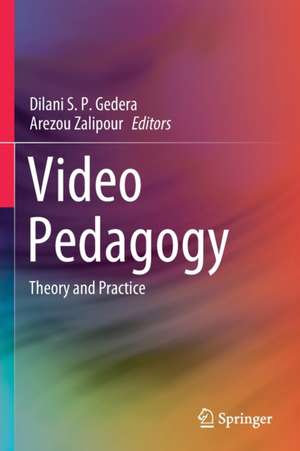Video Pedagogy: Theory and Practice
Editat de Dilani S. P. Gedera, Arezou Zalipouren Limba Engleză Paperback – 22 feb 2022
| Toate formatele și edițiile | Preț | Express |
|---|---|---|
| Paperback (1) | 888.01 lei 6-8 săpt. | |
| Springer Nature Singapore – 22 feb 2022 | 888.01 lei 6-8 săpt. | |
| Hardback (1) | 894.03 lei 6-8 săpt. | |
| Springer Nature Singapore – 21 feb 2021 | 894.03 lei 6-8 săpt. |
Preț: 888.01 lei
Preț vechi: 1082.93 lei
-18% Nou
Puncte Express: 1332
Preț estimativ în valută:
169.91€ • 178.36$ • 141.04£
169.91€ • 178.36$ • 141.04£
Carte tipărită la comandă
Livrare economică 11-25 aprilie
Preluare comenzi: 021 569.72.76
Specificații
ISBN-13: 9789813340114
ISBN-10: 9813340118
Ilustrații: X, 242 p. 52 illus., 45 illus. in color.
Dimensiuni: 155 x 235 mm
Greutate: 0.36 kg
Ediția:1st ed. 2021
Editura: Springer Nature Singapore
Colecția Springer
Locul publicării:Singapore, Singapore
ISBN-10: 9813340118
Ilustrații: X, 242 p. 52 illus., 45 illus. in color.
Dimensiuni: 155 x 235 mm
Greutate: 0.36 kg
Ediția:1st ed. 2021
Editura: Springer Nature Singapore
Colecția Springer
Locul publicării:Singapore, Singapore
Cuprins
Chapter 1. Conceptualising Video Pedagogy.- Part 1: Video, Students, and Learning.- Chapter 2. Building Undergraduate Nursing Knowledge and Practice Through Video.- Chapter 3. Effectiveness of Multiple Types of Video for Learner Engagement in Business Education.- Chapter 4. Flipping the Classroom: Using Video to Enhance First-year Undergraduates’ Cultural Competency.- Chapter 5. Stop Motion: Being Precise about the Uncertainty of the Design Process in Architectural Education.- Chapter 6. Learning by Watching Others Learn: Vicarious Learning from Videoed Tutorials.- Chapter 7. Video and the Pedagogy of Expansive Learning: Insights from the Military Engineering Education.- Part 2: Video, Teachers, and Practice.- Chapter 8. Flipping Professional Learning Through Videos in Mathematics Education.- Chapter 9. Video as an Instructional Tool in Transforming Teachers’ Pedagogical Practices and Mentoring Skills in Physical Education.- Chapter 10. Examining an Activity System of Learners, Tools, and Tasks in a Video Club.- Chapter 11. Te Ara Motuhenga (Documentary Pathways): Developing Video-based Teaching and Learning Resources for Documentary Practice.- Chapter 12. A Practical Guide to Video-making for Teachers: Key Principles and Tools.
Notă biografică
Dilani Gedera holds a Ph.D. in E-learning from the University of Waikato, and is currently a Teaching and Learning Manager at Auckland University of Technology, New Zealand. Prior to that, she worked as E-learning Designer and Teaching Developer at the University of Waikato and Otago Polytechnic. She has taught and researched in higher education in Malaysia, Sri Lanka and New Zealand for 20 years. Dilani has led several institution-wide curriculum design and Learning Management System (LMS) review projects. Her research interests are video in learning and teaching, technology-enhanced learning, curriculum design, and technological pedagogical content knowledge. Dilani’s previous project led to the publication of the book Activity Theory in Education: Research and Practice (2016). She is currently working on a national research project on ‘University students’ experiences of online learning as a result of a pandemic’.
Arezou Zalipour is an Associate Professor at the School of Communication Studies, Auckland University of Technology, New Zealand. She has worked in a variety of roles in higher education in several countries for more than 21 years. She has worked extensively on pedagogy and video technologies. Her research interests cluster around screen production, cinematic storytelling and film aesthetics, multiculturalism and diaspora in New Zealand, and screen practice as research. Her past project offered an innovative insight into New Zealand film through the first conceptualisation of ‘Asian New Zealand Cinema’, which inaugurated diasporic film and film-making in New Zealand. Arezou’s recent book Migrant and Diasporic Film and Filmmaking in New Zealand (2019) has generated significant media, public and industry interests. Currently, she is working on a screen production research project and the production of a documentary.
Textul de pe ultima copertă
This book conceptualises the ways in which video has created a pedagogy for current learning and teaching practices, disciplines, and environments. It brings together the concepts and practice of video as pedagogy by providing theoretical discussion and practical guidance and recommendations on the use of video in learning and teaching, drawing on a wide range of case studies including nursing education, business education, architectural education, engineering, mathematics, physical education, science education, and screen production. Part I focuses on ‘video, students and learning’ and Part II on ‘video, teachers and practice’. The book covers various perspectives on the concept and use of video in learning and teaching: developing students’ practical skills and knowledge; using video for teaching culturally sensitive topics and cultural competency; for feedback, reflection, training and professional development; making and producing videos for educational purposes, with discussion on techniques, devices, software and strategies.
Caracteristici
Gives insight into trends in video in the context of learning and teaching
Demonstrates ways to use video as pedagogy to engage learners, and examples of teaching development and reflective practice
Provides a wide range of examples from various educational contexts to illustrate concepts and practice of video as pedagogy
Demonstrates ways to use video as pedagogy to engage learners, and examples of teaching development and reflective practice
Provides a wide range of examples from various educational contexts to illustrate concepts and practice of video as pedagogy
